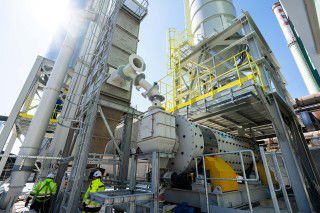This week, Cemex was quick to announce that it was resuming operations, having previously fallen into line with the National Cement Chamber’s (CANACEM) decision to cease cement plant operations in Mexico on 2 April 2020.
Pressure to keep construction and cement sectors operational
Cemex's announcement was a rapid about-turn on the advice that CANACEM president, Jaime Rocha Font, had given earlier: "We will stop supplying public and private works as of Saturday 4 April, this including the more than 62,000 hardware stores in the country and other distributor."
CANACEM groups – Cemento Cruz Azul, Cementos Fortaleza, Cemex, Cementos Moctezuma, Grupo Cementos de Chihuahua and Holcim, were assured that staff would be maintained with their full salary and benefits during the emergency period. These restrictions were expected to last until the end of April, because of the COVID-19 pandemic, but Cemex says it will now comply with the new technical guidelines published in the Mexican gazette and advice from the Ministry of Health to ensure workers can resume work safely.
Claudia Sheinbaum Pardo, Mexico City's head of government, had said that she is working with some cement companies to prevent stoppage of priority work, such as the St Lucia Airport. The Mexican Chamber of Construction Industry (CMIC) for Querétaro state had also requested that the president make the construction industry an essential industry to keep construction projects running.
Financial impact and falling volumes
Cemex had previously said in March that it was also raising debt levels to open up lines of credit to fight the economic difficulties presented by COVID-19. The company improved its liquidity with a US$1.14bn revolving credit line and by receiving almost US$500m from asset sales, while it said it was evaluating postponement of some investments in fixed assets for this year. In February 2020 the company reported Mexican cement volumes slipped by 13 per cent amid the markets caution at the start of President Andrès Manuel López Obrador’s administration.
"Performance during the year was affected by muted public and private investment in a government-transition year and by delays and suspensions of building permits in Mexico City," said a Cemex statement.
While the country produced 39.82Mt of cement in 2019, it was down seven per cent on 2018. Mexican cement production reached 3.243Mt in January 2020 up 4.4 per cent on January 2019, perhaps indicating a return to growth before the pandemic set in.
Mexico's President announced that he would tighten government austerity measures in the face of COVID-19, but that some increases in public investment will be made without raising public debt. However, the Centre for Research in Public Policy think tank forecast that 1m Mexican people would become unemployed or work fewer than 20h/week and 0.5-0.6m people would lose their jobs as the impact of COVID-19 spread across the country.
Renewable projects face supply chain disruption
A slowness to impose restrictions in Mexico to the COVID-19 pandemic has not prevented problems in supply chains and energy. Wind turbine components being built in Spain and the UK have been on lockdown, which has caused work to stall on Mexican wind farm construction projects. The cement sector is one of the big customers for renewable power projects with Grupo Cementos de Chihuahua SA de CV (GCC) informing its investors at the end of last year that some 20 per cent of its power would be sourced from solar power going forward. The company secured a 15-year deal, to come into force in January 2021, with a Mexican solar power supplied for its cement factory in Juarez, ready-mix and aggregates operations as well as corporate offices. This will save the cement producer approximately US$2.5m per year in electricity costs.
Holcim Mexico looks to complete new plant
There has been no news from Holcim Mexico of any slowdown or progress in its plans to push ahead in its new investment of a 0.65Mta grinding plant in Yucatan. The new unit was announced in October 2019 with a cost of US$40m, and the generation of 400 direct and indirect jobs. The new factory will allow product to be manufactured locally in Yucatan rather than being sent from plants in Macuspana, Tabasco, Orizaba and Veracruz. The grinding plant will be located in Umán next to the Holcim Distribution Center, just 30 minutes from the state capital and 15 minutes from the Merida International Airport. The plant is currently scheduled to start operating in 4Q20 but may suffer delays due to the COVID-19 outbreak.
Border wall construction continues
Meanwhile, the USA has been ramping up construction of its multibillion dollar southern border wall with Mexico, despite the rapid spread of the coronavirus. Customs and Border Protection announced plans for more than 150 miles of the 30ft border wall in Arizona, New Mexico and California. US President Trump has pledged to erect or replace 450 to 500 miles of the wall by the end of 2020 at a cost of US$18.5bn.
